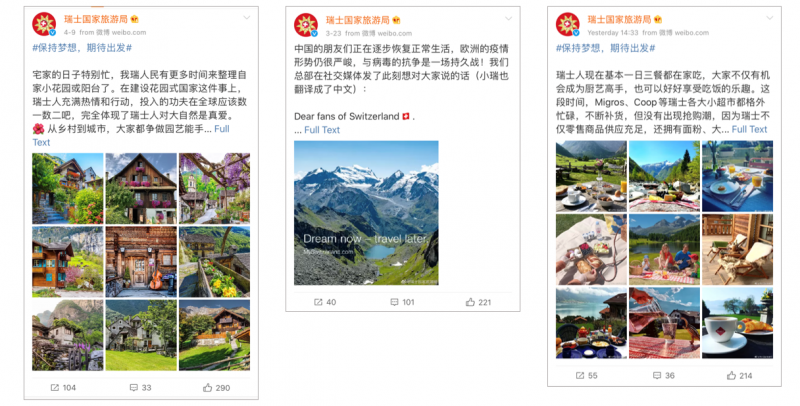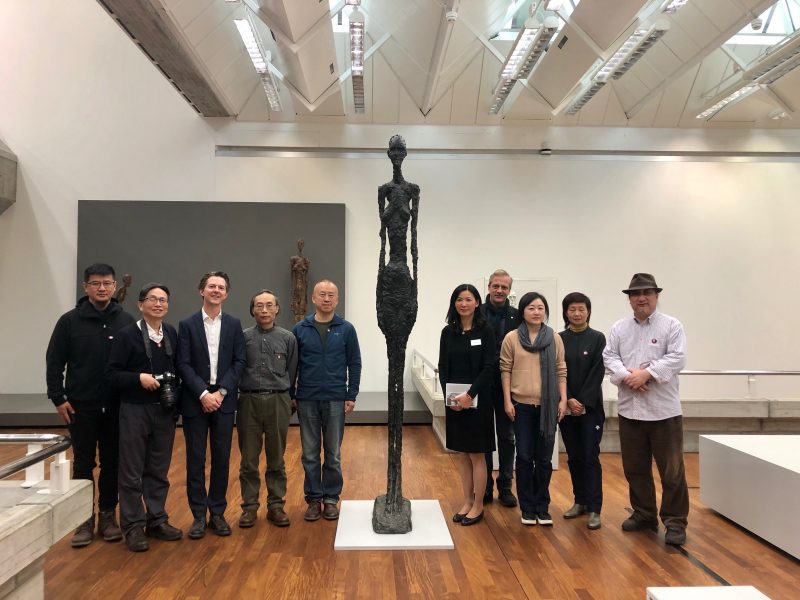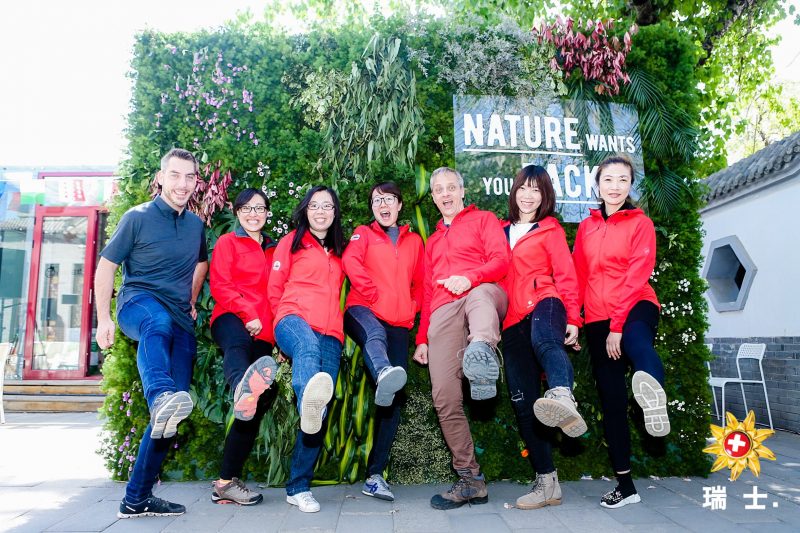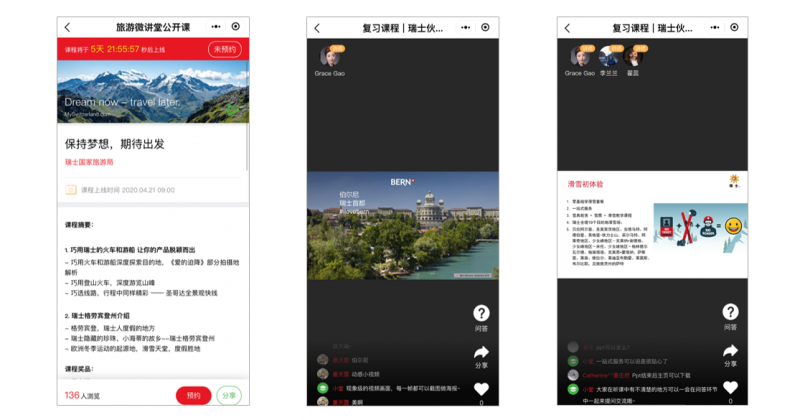As the first European country to target the Chinese tourism market, Switzerland has a wealth of experience and insights on how Chinese travelers have changed over the past decades, and the most effective ways to attract them. 2019 was a record-breaking year for Chinese overnight stays in Switzerland, with more than 1.8 million hotel nights, and close to 1.3 million arrivals.
Dragon Trail spoke to Simon Bosshart, Director China and Director Asia Pacific for Switzerland Tourism, about maintaining digital marketing during the coronavirus crisis, helping travelers to get off the beaten track, and what’s next for Chinese tourism.
Switzerland Tourism’s “Dream now, travel later” campaign has been very successful on Weibo, and received above-average views on WeChat, too. Can you tell us about the thinking behind this campaign, and if anything about it has been adapted especially for a Chinese audience?
There’s not much more you can do right now – it’s the only message you can have, apart from stay home. I think we were rather early communicating about it. With this claim and visuals, this is centrally steered, coming from Zurich. The Weibo and WeChat communication that we do is steered out of China, and the content isn’t completely changed, but of course adapted.
With one aspect we were very early, because China was the first country where the crisis started. We immediately set up a task force internally and started to react. We had the first post, which wasn’t “Dream now, travel later,” but was actually accurate information on how Switzerland was reacting to the crisis at that time, at the end of January and beginning of February. That was very China-focused, so we had messages like Switzerland stays China-friendly; that Switzerland Tourism encourages the industry, especially the hotel industry, to be very generous when it comes to cancellations; this is what you have to do if you travel to Switzerland, if your flight it canceled and you can’t get back – more practical information.
This as well as the “Dream now travel later” [campaign] was extremely positively perceived. We had a lot of reactions, a lot of comments, as well as a lot of encouraging comments, like “we really hope that Switzerland will come back soon,” “we will come back,” these kinds of comments.

Switzerland Tourism’s “Dream now, travel later” campaign has been very well received on Weibo
At the very beginning we were not sure what to do, and we stopped for maybe two or three weeks at the beginning when it started in China, and since then we came back to normal. What we try to do at this time, and why we insist on continuing, especially on digital channels, is to communicate normally again. This is not out of the consideration that it’s the high time for making tourism advertisements, but because we should try to stay as normal as we can. A lot of things are not possible – physical meetings are not possible, or road shows. The only thing we can do is communicate digitally. And with people being at home, the only thing they can do is connect with the world on digital channels, and they’re probably very receptive to this. So we said, it’s very important to stay visible, with normal storytelling, and just to show, there is a crisis right now, but things will go back to normal sooner or later, so let’s wait for that and be patient.
Switzerland has long been a market leader in Europe for attracting Chinese tourists. What marketing strategies and activities have worked best? What has stayed consistent about your approach to the Chinese market over the past decade, and what has needed to evolve?
I think Switzerland stands very much at the front position due to the fact that we were the first tourism board active in China, at least from the European world. We’ve been doing marketing in China for over 20 years now, so this gives us a certain advantage. We invest over-proportionally into China. China has been for a long time a strategic growth market. So from a global strategy side, we have always considered China as a very important market to invest, while many other destinations may have only followed later. We believed in China when China was not an important market in tourism, at least not for Switzerland.
When you talk about the recipe for success for Switzerland, one thing is consistency, staying with the market and investing in the market. The second thing, I would say, is [our] team. We have 15 people on the ground and three offices in mainland China. [It’s] a mature team, a very senior team, with some people who have stayed with us since pretty much the beginning. The most junior person in the team has been with us for at least five years, so we have a lot of experience, a lot of knowledge, a lot of creativity, and a lot of expertise in the field. One last consistency is we try to always be very close to the market, and we put personal contacts, networks, and relationships in the front row – so having these networks with the travel trade, with media, staying in touch with them, talking to them, bringing them to Switzerland. This is just the ultimate reason for success. This we take very seriously.
Talking about the changes, one of the major changes is over the past five to seven years, we completely changed our marketing strategy. Today, we are not striving for the mass from China, not anymore. We’re striving for the guest which suits the destination of Switzerland most and can take most profit out of Switzerland, and that’s the individual traveler. We went through a global strategy adjustment, defining the areas we’re strongest in. Switzerland has been a travel destination for 150 years, and we’ve always been not a cheap destination; we could never compete with others based on the price level. So five years ago we said, we have to be very clear which customer we’re actually talking to. And we need to understand where we are really strong. Which fields, would people say, in this field, Switzerland is so good, that even though I could go somewhere else, I want to go to Switzerland for this reason. We segmented our products and our market and said, which of those segments exist in a specific market, so we can serve them directly, where the readiness of the guest is higher.
 Influencer trip with professors in Arts, Design and Architecture at the Zurich Arts Museum, January 2020. Photo courtesy of Switzerland Tourism.
Influencer trip with professors in Arts, Design and Architecture at the Zurich Arts Museum, January 2020. Photo courtesy of Switzerland Tourism.
For China, apart from the attraction tourers – the regular FIT tourist which travels through the country and sees the highlights – we defined specifically summer outdoor and winter outdoor guests, plus cultural travelers, as our most important segments. While in the past, we were focused on the mass, on big business, on group travel, and we said “whatever it takes, come to Switzerland and stay for one night, two nights,” [now] we say, come to Switzerland if you want to come for deep travel – for hiking, for biking, for skiing, for trail running, for art, for some kind of cultural experience and interaction with locals, and especially if you come as an individual traveler. I know it’s a buzzword to say we focus on quality tourism, that we focus on the individual traveler – every destination at least says that they do this, but I would say we’re one of the few destinations which really consistently does it. We really focus now on new players, boutique networks, on clubs and communities.
Technology-wise, everyone talks about digital channels. For our team in China, of course we believe it’s the way to communicate today, but this is not the solution alone. This is just the technical solution for how we talk to guests. The most important is to know who your guest is and how to talk to him. So we’re talking about not just digital marketing, or social media marketing, or influencer marketing, but community marketing. And community marketing means you talk to ski clubs, you talk to art lovers, museum directors, to writers, to art collectors. You have to dive into the niche.
How do you find these people to reach out to? Is that more organizing offline events?
It’s offline and online. Our life has become so digital, but at the end of the day, you need to meet people. When we work with skiers, for example, we communicate with them through digital channels, but at the end of the day, they go skiing, and they don’t do it on their computers with virtual reality but with real nature. So it’s always a combination.
Are there any differences between your marketing strategy for China, and other East Asian markets?
Of course. The strength of Switzerland Tourism is that we are very decentralized, with independent marketing teams, and these are led by personalities. With marketing there’s not one correct solution for everything, but it’s always coming out of the market and depends on the capabilities that we have. In Korea, for example, we’re very strong with celebrity marketing – we work with the K-pop world, with soap operas, and this relates to our market director there, who has built up a very strong network over the years to the celebrity world. This works very well in Korea, where young people and travelers especially follow the trendy selection of their idols. Japan is very much content driven, and is the oldest travel market for Switzerland, so here again we take a different approach. In Southeast Asia, we are still building up the market. There are a lot of tourists from Southeast Asia, especially Thailand, that might be first-time travelers, and group travelers, so it’s a different approach to China. Of course we have certain central campaigns, but our strength is that the independence and the empowerment of the market is very high for Switzerland Tourism. And that’s part of Swiss culture – we’re a very decentralized country with canton independence, so the same goes for our marketing.
Is the team in China all Chinese?
That would perhaps be another point of success. Apart from myself, we have one Swiss in the team in China, and the rest are locals. I think it’s this mix that makes it very efficient. We have constant interaction between the cultures, and we bridge the cultures within our team. I take it very seriously to build the bridge, and also to go over the bridge for my team. Working for Switzerland Tourism means you have to become a bit Swiss, but we also have to become a bit Chinese. My team [has] taken some Swiss work styles. But also on the other side, we are two Swiss working with China, and we’re both fluent Chinese speakers.

Switzerland Tourism’s China team on the occasion of the Switzerland Summer Launch in Beijing, April 2019. Photo courtesy of Switzerland Tourism.
What advantages does Switzerland have for attracting Chinese tourists after the COVID-19 crisis has passed? Do you expect that Chinese tourists in Switzerland will change the way they travel after the crisis?
What we were expecting at the very beginning is that as soon as this virus is over, people will do nothing but travel. But … this coronavirus is not some kind of temporary illness that’s over, and everything goes back to how it was before. It will hopefully go back as much as possible, but it will not simply recover in a few weeks.
I strongly believe that the coronavirus will change us all, in our thinking. It brings us back to what is really essential in our lives. Most people will have a family revival. With your husband or wife, or with your kids, you’re forced to be together very close, and find a way to communicate more together, so family ties become more and more important. I saw this from your study and also heard it from friends in China, people who say “I really enjoy that, that I have more time with my family.” I think this is a quality which will have a strong impact on traveling. So people might travel more in families, probably will appreciate more things that you can do as a family
They might have more basic needs, like security, safety, more relaxed atmosphere, less crowded places, not just rushing through a place. Nature will become some sort of a new quality. I see a lot of topics and themes where Switzerland is very well positioned. So I think Switzerland will go stronger out of this crisis than we entered it. Not in terms of actual business, not in the short term. It’s not just that we think, let’s wait until the Golden Week, and then we’ll be back on track, and then 2021 will be again a fantastic year. We’re not going back there. We lost the base and we’ll have to restart. I think what Switzerland will lose is more market share in the mass market business. But I think we will strengthen our positioning in the individual travel market, so strategically, we’ll grow stronger out of this crisis.

A young Chinese family enjoying nature in the Sertig Valley. Photo courtesy of Switzerland Tourism.
In the long term, perhaps one effect that this crisis will have, is that we have to think about our travel behavior. I’m a frequent traveler, I love to travel around the world, but what I take out of this is, is that if people do a long-haul trip they stay longer, travel slower. This is something from the past – jumping from destination to destination. People should be more considerate in how they move.
A target for the future is sustainable travel, in an ecological, economical, and social dimension. If we position ourselves in the areas of sustainable tourism, we can’t say, “Fly as much as possible to Switzerland to be green here.” We need to think about what that means for our positioning. Even more, we’ll position Switzerland as a boutique destination, not a destination for a short weekend trip overseas. If you come to Switzerland, treat it as what it is. It’s a precious thing. It’s a boutique product you have to enjoy with all your senses. Come, stay, travel slow.
What does Switzerland Tourism do to promote off-the-beaten track destinations to Chinese travelers?
China is an interesting market for this. In China, [for] the mass, like everywhere in the world, it’s the big landmarks which everybody wants to see. If you think of a country, you have your two to three landmarks in mind which you know you have to see once in your lifetime, and so you work through your bucket list. But at the same time, Chinese are much more curious to go off the beaten track. We have been working very early on some solutions, on the product side, trying to reflect this and make proposals for how to experience Switzerland off the beaten track.
First of all, the best thing that Switzerland has on this side, is we have a Swiss Travel Pass, which includes the entire public transportation system of Switzerland – and the public transportation system is not just a combination of a couple of main lines, but it’s a very complex system that connects basically every part of Switzerland that has permanent inhabitants. This, for tourism, is an extremely precious tool to promote off the beaten track traveling. Chinese have really discovered this – China is by far the biggest market for this pass.
A second initiative is the Grand Tour of Switzerland, for self-drive. It’s a road experience in Switzerland, doing a circle, starting and ending from Zurich, so you can really experience the whole Switzerland on a self-drive base, with everything that Switzerland has to offer, with mountain passes, all the UNESCO World Heritage sites along the route, a lot of castles, old villages. This is the approach we take to bring people off the beaten track. This is not just telling cool marketing stories – you need to have the product for this.
Is the Swiss Travel Pass something you’ve promoted specifically to the Chinese market?
Yes, the Swiss Travel Pass is a product available for any person globally permanently living outside Switzerland. We promote it in many markets. It is most popular in China, Korea, the United States, then India, and Southeast Asia. We do a lot of marketing. In our Chinese team, two of our colleagues in the Switzerland Tourism Beijing office are officially members of the Switzerland Tourism team, but they are both 100% mandated to work on the Swiss travel system. We have two people working only for public transportation promotions in China, so we do a lot for this.
This spring, Switzerland Tourism is launching a new series of CTA Live online courses for the Chinese travel trade – why do you think it’s important to be doing B2B marketing to China, even during this period when international travel is frozen?
We started to do travel trade webinars two years ago, so it’s the third season we’re doing it. In a big country like China, we’re not able to reach out to the masses or all the expanding number of agencies, boutique operators, and junior staff which need to be educated about Switzerland, so having such a platform, we consistently continue with our way of working with the Chinese travel trade. In addition to the webinars, we do have an e-learning platform, which is a self-study platform, which we’ve done for 13 years already. And a third step is also taking more networking with the travel trade for sales calls and taking it digital.
In the coronavirus environment, the only way that you can communicate with the travel trade or with anybody is digital channels, so it’s the right time to continue such an approach.
What do you have planned for content of this new series?
We have an annual plan for all of the units. We do this in close cooperation with our tourism partners. They can contribute with one session per season. We always combine two partners or two providers in one session, so it’s always roughly two 15-minute slots for a specific region or service provider, followed by a Q&A session. We try to cluster it along the season – the main seasons we promote in China is the summer season and the winter season. So there’s a series of webinars around the summer and around the winter. This is also an instrument that we’re trying to grow, to intensify, to do more. It’s a more convenient way to do education – they don’t need to commute, or spend a lot of time joining an event. You can easily do it at home, on your lunch break, or from your computer at work.
 Upcoming and past CTA Live webinars by Switzerland Tourism to train the Chinese travel trade
Upcoming and past CTA Live webinars by Switzerland Tourism to train the Chinese travel trade
Are you adapting any content of the webinars in light of the coronavirus crisis?
Not really. We are not the public health authority. The webinar is to educate about traveling in Switzerland under the normal circumstances. Content-wise, we’ll definitely focus on qualities that Switzerland has in the long term. This is not sales; it’s educational and training. It’s for people who try to keep up to date. In the travel industry, education is so important because it’s about knowing so many destinations alongside each other. These online technologies that we have now to train people without them having to travel, that solves a big issue, and it’s a very powerful instrument to do long-term educational marketing.
Sign up for our free newsletter to keep up to date on our latest news
We do not share your details with any third parties. View our privacy policy.
This website or its third party tools use cookies, which are necessary to its functioning and required to achieve the purposes illustrated in the cookie policy. If you want to know more or withdraw your consent to all or some of the cookies, please refer to the cookie policy. By closing this banner, scrolling this page, clicking a link or continuing to browse otherwise, you agree to the use of cookies.